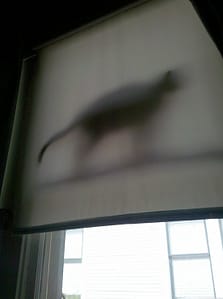They’re edited people, Drin says.
Dance looks over at the game controller, and away at the wall again. Drin got him that to keep him from getting too bored. He still loves to find things that please them. Their big rangy freckled husband, the guy who laughs with his whole belly, and loves spicy food… Drin still can’t resist Emma reading him stories in her Aussie accent, and he still snores a little when he sleeps on a hotel bed, the way he’s finally out of it at Dance’s back right now.
Dance has been shocked and upset at other changes in his partners. Losing everything all at once is quite a learning experience for them all. He was startled at how they have stuck it out in this room. They’ve clearly got colds or something, but they’re still getting up to take care of him.
They should be snoring their heads off, exhausted, sick, cranky. Emma and Drin are both sniffling and sneezing. Everything aches, and their noses are raw from using tissues. Drin says the other symptoms that they all share are an immune system overload of some sort, and possibly it’s just a cold, possibly something more. Drin waved it off, saying they’re all getting such bad headaches that they couldn’t be make much mileage if they hit the road anyway. Disappearing into a hole for awhile is a nice trick anyway, he says.
Drin might be a veteran, he might be an auditor with a gift for numbers who speculated brilliantly on stocks and got rich at the right time, but he was something else before. Drin isn’t just the kind of fabulously popular symphony patron who gets to fuck the Concertmaster against the storage closet door whenever he takes the notion into his head. Drin is able to remember there’s some other story to tell.
Drin tells him that it was all made up. Like them, Drin was made to remember things that never happened to him. He says most of his memories are borrowed time. He too has had his awkward bits blurred away, leaving imperfect traces. Drin isn’t sure of his own mind. He clearly doesn’t have answers to some of the most obvious things: Oh, yes? How it was done?
Something like that slidecoated tail on the bed comes from some other place, and so does Drin, the only one of them who remembers entire chunks of that other time, not just nightmare fragments. He will blurt out the most startling things–elaborate, detailed, harshly expert–clearly knowledge from some person that he once was–and then the edges of that selective knowledge go all fuzzy on him.
That’s when Drin stutters to a halt, confused. His descriptions of that, trying to explain why he can’t explain, are painfully, nakedly, upsetting. Dance has noticed that Emma has been cautious of pushing Drin for more talking when Drin has run out of answers.
It’s Drin who has the most fundamental craggy outcroppings of some former life washing up, suddenly visible among the mess, hard planes of basal rock that resists the tide that’s swirling away with their ordinary lives.
Drin proves to have new words for old games. It used to be just horsing around. Now it’s called testing Dance’s reflexes. Drin carefully massages Dance’s legs and feet to help manage the pain, but he also tests the feeling in Dance’s toes. He asks Dance to perform simple exercises as diagnostics on his coordination. Sometimes they toss small juggling beanbags back and forth, within the limits of Dance sitting or lying on the bed. Drin kneels or sits on the bed next to him sometimes, steadily juggling the beanbags, and invites Dance to snatch the bags out of the air, just as he used to invite Dance to horse around in the living room.
Now Dance’s hands can swat up and grab fast-moving bags idly, precisely, in a way which he was never able to do before. It’s a strange improvement, among many other changes that are not helpful at all.
What’s disturbing is that now he recognizes that Drin has played some of these testing games with him before, horsing around, laughing, not making a big deal out of it. Dance used to love grappling around with him, they always ended up in tickling or wrestling matches and then rolling around making love somewhere unlikely.
Then there’s Emma wither her scholarly precision, all those uncanny things she says. Who knew that Emma gets cranky when she’s isolated from all her reference sources for too long? Who knew that she remembers everything after she’s watched the news?
It turns out that some of her odd pauses in conversation, over the last few years, actually meant that she was locking onto whatever she’s looking at, remembering if she’s ever seen anything about that object, anywhere, in any source. She just didn’t say it, before. She knew it was weird. Now, she will share it, just in case they’ll need to know.

Emma is one tough, resourceful chick. She used a chain of anonymizer computer websites as a phone service, called the Humane Society back at home, asked them to check on the crying puppy in their abandoned house. She was even able to call a second time, to learn the animals were picked up and safely in the animal shelter. She said their pets might be at risk of euthanasia, kennel cough and distemper, but they weren’t going to die for lack of water and food.
Dance is not going back to see his garden and his potted plants and all his instruments. That part doesn’t hurt at all, oddly. There’s just a numb place, ever since they worked out how to get the pets out of there. He’s content with that, knowing things are out of his control. She’s not, but she’s aware that getting sentimental might endanger other people, and she won’t do that.
Dance hasn’t had enough brain cells to knock together to begin to ask the real questions, honestly.
They agree that all his memories of growing up and family and silly songs and learning to play guitar and then the violin, those were all lifted in a bad copy from somebody else’s mind, not even from the correct era. But what makes him ask questions about himself, is the money. Classical musicians do not often make enough money to save up that far in America, let alone in Korea. Where did the money to immigrate come from?
It wasn’t just the Metro’s prize grant. He doesn’t remember how he must have got his savings built up enough to immigrate, who provided the necessary regular income to satisfy the IRS. He’s forgotten the face of whoever it was did the right letters to sponsor him to come, some name on the symphony patron’s list he never met. He doesn’t remember exactly who gave him the final amount of money to cover the first few months in the US, he has no idea where some of it came from in the first place.
It bothers him that he doesn’t recall any of his family ever visiting the States in person. Not even any trips to Disneyland. He doesn’t recall ever seeing his family, doing trips back in Korea, not since he first auditioned for the Metro Symphony. But people can go for years on their own, that is not unusual for the first immigrant to a new country, when they’re poor and struggling just to pay the rent. Nothing strange in that.
He did have that box of family prints, old color prints with a few random strips of developed film in there. The prints were faded, cracked, irreplaceable. When Drin scanned in each picture, he commented on the odd unrelated pictures on those strips. But there were real people in those pictures. Yes, Drin said their memories were all doctored. Yet, there were real people out there talking to him, to Emma, to Drin himself. Live people left him voicemail messages, sending him increasingly concerned emails over the last few months. He doesn’t know why they were growing worried.
Whoever they might really be, they spoke to him as a person in the last few months, talked to him in the way that concerned, decent people do. Dance knows they’re going to worry about him disappearing, just as Emma’s sisters and mother will do back in Australia, the people he heard her laughing with in an accent so broad he couldn’t make out the words at all.
Dance kept emails from his teacher in Korea, short messages full of kind thoughtful advice. He especially remembers those. His grandmother-teacher seemed to know all about dropping everything and starting over. She talked about being stubborn on choosing to be cheerful, be brave on accepting the strangeness, just let it pass through him so he can move on.
She told him–and she was right, of course–that his first six months in America had to be the hardest for him, then it would get easier. After that, he would find himself adjusting to the new country, the new food, the new rules, the new people.
He should be using that attitude for this strange new life, too. It’s useless wishing that he could talk to her. It doesn’t matter if they really are related or not; he wouldn’t dare contact any of them now, purely out of fear for their safety. The person who doctored perfume for Emma can find their families too, easily enough.
Looking at the dents laid in the mattress by his invisible tail, it’s hard to dispute the story that maybe those people aren’t his blood relations and he doesn’t come from Korea. And Emma isn’t from Australia. Or at least, not the same country that they could fly to right now.
